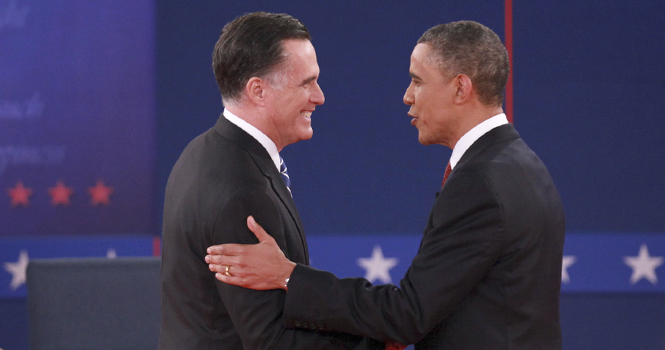Bashed by Obama and Romney at debate, China shows its patience is wearing thin
President Barack Obama, right, and Republican presidential nominee Mitt Romney shake hands at the start of their second presidential debate at Hofstra University in Hempstead, New York, on Tuesday, October 16, 2012. Photo by John Paraskevas/Newsday/MCT.
October 17, 2012
BEIJING (MCT)—In the aftermath of a U.S. presidential debate that included blistering accusations about unfair Chinese economic practices, a commentary carried by China’s state Xinhua newswire on Wednesday warned that targeting its country’s products or currency would risk a trade war. While the analysis was far from a statement of intent by senior Chinese leadership, and stopped well short of past media tirades sparked by foreign policy issues, it signaled fraying patience in Beijing with a U.S. presidential campaign that’s featured criticism of China by both President Barack Obama and Republican challenger Mitt Romney.
“If ‘President Romney’ was determined to keep his words by throwing punitive tariffs against Chinese products exported to the U.S. market on Day One, then China perhaps would be forced to fight back, and then his administration would be very likely to be on its way to a global trade war,” said the item, which was attributed to a writer named Liu Chang and posted on the news service’s English-language website. “Such a scenario would ultimately bury his other promises, not least the one to jumpstart the sluggish U.S. economic growth.”
Chinese news organizations have published several pieces lately complaining about U.S. “China-bashing” this election season.
During Tuesday night’s debate, the word “China” came up 21 times, according to a transcript, as Obama and Romney alternated between pledging to confront the nation and criticizing each other for having failed to do so.
The specific quote to which Xinhua was referring was one by Romney in which he said, “China has been a currency manipulator for years and years and years. And the president has a regular opportunity to label them as a currency manipulator, but refuses to do so. On Day One, I will label China a currency manipulator.”
Although the United States has a massive trade deficit with China in goods and services — $282 billion last year — the value of the Chinese currency, the yuan, against the dollar has been increasing, undercutting the argument that Beijing should be sanctioned for keeping its value artificially low to make its products cheaper.
Financial news agencies reported last week that the yuan had hit a 19-year high. In May, the Peterson Institute for International Economics, a non-partisan research center in Washington, revised its estimate of how much the yuan needed to strengthen to reach “equilibrium” with the U.S. dollar, from 28.5 percent last year to 7.7 percent.
Xinhua ran a separate report on Tuesday quoting Vice Foreign Minister Cui Tiankai in Brussels saying that his nation wants to avoid trade wars. “We believe that an open trading system serves the interest of everybody, especially in the difficult time of the global economy,” Cui said. “If there is any trade war between the major trading states in the world, nobody will be better off.”













